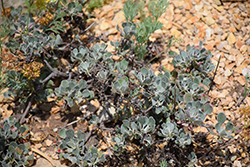It's all about ...
plants

Plant Height: 3 inches
Flower Height: 12 inches
Spread: 24 inches
Sunlight:
![]()
![]()
Hardiness Zone: 8b
Other Names: Talus Buckwheat, Mat Buckwheat
Description:
An attractive groundcover plant for use in xeriscaping; a native perennial producing pale yellow to pale pink flower clusters, rising above the gray-green foliage in summer; excellent for rock gardens or naturalizing
Ornamental Features
Bear Valley Buckwheat features showy clusters of buttery yellow flowers with creamy white overtones rising above the foliage from late spring to late summer, which emerge from distinctive white flower buds. The flowers are excellent for cutting. Its attractive small tomentose round leaves remain grayish green in colour with hints of silver throughout the year.
Landscape Attributes
Bear Valley Buckwheat is a dense herbaceous evergreen perennial with a ground-hugging habit of growth. It brings an extremely fine and delicate texture to the garden composition and should be used to full effect.
This is a relatively low maintenance plant, and is best cleaned up in early spring before it resumes active growth for the season. It is a good choice for attracting bees and butterflies to your yard, but is not particularly attractive to deer who tend to leave it alone in favor of tastier treats. Gardeners should be aware of the following characteristic(s) that may warrant special consideration;
- Self-Seeding
Bear Valley Buckwheat is recommended for the following landscape applications;
- Mass Planting
- Rock/Alpine Gardens
- Border Edging
- General Garden Use
- Groundcover
- Naturalizing And Woodland Gardens
Planting & Growing
Bear Valley Buckwheat will grow to be only 3 inches tall at maturity extending to 12 inches tall with the flowers, with a spread of 24 inches. Its foliage tends to remain low and dense right to the ground. It grows at a medium rate, and under ideal conditions can be expected to live for approximately 10 years. As an evegreen perennial, this plant will typically keep its form and foliage year-round.
This plant does best in full sun to partial shade. It prefers dry to average moisture levels with very well-drained soil, and will often die in standing water. It is considered to be drought-tolerant, and thus makes an ideal choice for a low-water garden or xeriscape application. This plant does not require much in the way of fertilizing once established. It is not particular as to soil pH, but grows best in sandy soils. It is highly tolerant of urban pollution and will even thrive in inner city environments. This species is native to parts of North America..
This plant is not reliably hardy in our region, and certain restrictions may apply; contact the store for more information.
